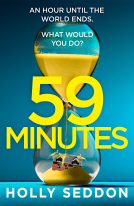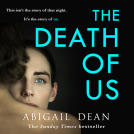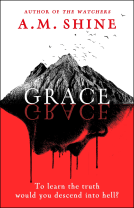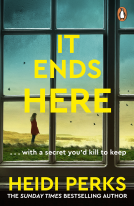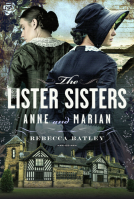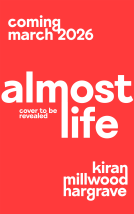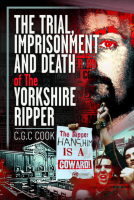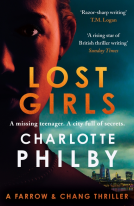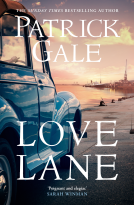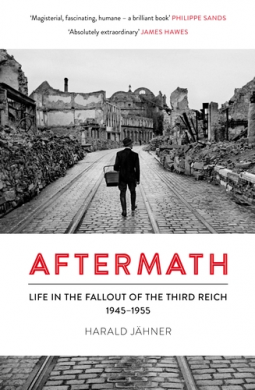
Aftermath
Life in the Fallout of the Third Reich, 1945–1955
by Harald Jähner
This title was previously available on NetGalley and is now archived.
Send NetGalley books directly to your Kindle or Kindle app
1
To read on a Kindle or Kindle app, please add kindle@netgalley.com as an approved email address to receive files in your Amazon account. Click here for step-by-step instructions.
2
Also find your Kindle email address within your Amazon account, and enter it here.
Pub Date 17 Jun 2021 | Archive Date 1 Oct 2021
Random House UK, Ebury Publishing | WH Allen
Talking about this book? Use #Aftermath #NetGalley. More hashtag tips!
Description
'Magisterial, fascinating, humane - a brilliant book of the greatest importance and achievement' PHILIPPE SANDS
'Absolutely extraordinary. Every page stops you dead with insight and revelation' JAMES HAWES
'For those who want to understand the Germans, Aftermath is essential reading. Anyone with even the slightest interest in history and the human condition should read this book' JULIA BOYD
Germany, 1945: a country in ruins. Cities have been reduced to rubble and more than half of the population are where they do not belong or do not want to be. How can a functioning society ever emerge from this chaos?
In bombed-out Berlin, Ruth Andreas-Friedrich, journalist and member of the Nazi resistance, warms herself by a makeshift stove and records in her diary how a frenzy of expectation and industriousness grips the city. The Americans send Hans Habe, an Austro-Hungarian Jewish journalist and US army soldier, to the frontline of psychological warfare - tasked with establishing a newspaper empire capable of remoulding the minds of the Germans. The philosopher Hannah Arendt returns to the country she fled to find a population gripped by a manic loquaciousness, but faces a deafening wall of silence at the mention of the Holocaust.
Aftermath is a nuanced panorama of a nation undergoing monumental change. 1945 to 1955 was a raw, wild decade poised between two eras that proved decisive for Germany's future - and one starkly different to how most of us imagine it today. Featuring black and white photographs and posters from post-war Germany - some beautiful, some revelatory, some shocking - Aftermath evokes an immersive portrait of a society corrupted, demoralised and freed - all at the same time.
Available Editions
| EDITION | Other Format |
| ISBN | 9780753557860 |
| PRICE | £20.00 (GBP) |
| PAGES | 400 |
Average rating from 56 members
Featured Reviews
 Reviewer 724509
Reviewer 724509
This is a fascinating and chilling read about the years that followed World War Two. A period of time that is often ignored, I found it interesting to read about what happened when the was finished, a fantastic read.
 Anita W, Reviewer
Anita W, Reviewer
This book is possibly one of the most astonishing and heartbreaking titles I’ve read in some 60+ years of extensive reading. It’s taken me a while to fully understand the extent to which my knowledge of history, particularly the world wars, is coloured by false and misinformation. In Britain, as a post war child, I was taught about the Blitz and how badly Coventry was bombed etc. What a pasting the nasty Germans gave us and ‘we won the war’. There are no winners in war. Losses for both sides are inestimable and to examine the economies of Germany and the UK now throws up many surprises given that background. As a child, nobody told me that the Allied forces killed over 50,000 people in a single night of bombing Hamburg. More than the total killed throughout the entire Blitz.
The point is that there are two sides to every story and Aftermath presents the reality of a devastated Germany. Rather than focus on politics or economics, it’s presented from the reality of the impact on day to day life of the people. Cities with no infrastructure, no laws, no homes, no food or water…and interspersed with stark black and white photos. It’s a truly powerful depiction of the real horrors of war for the civilian population and should be compulsory reading on every school syllabus. Remarkable, readable and very moving.
My thanks to the publisher for a review copy via Netgalley.
A comprehensive account of what happened after WWII in Germany.
This was an interesting account of a subject I knew very little of, some of which never even occurred to me.
The many displaced people to be repatriated interested me the most. The extracts of real accounts gave an authenticity to the chapters.
The journey that Germany took from the end of the war through to rebuilding their lives and economy was not an easy one and this book details how they achieved this.
I found some of the writing repetitive but mostly of good quality.
It opened my eyes to many things I wasn’t aware of and found this book of great use.
Many thanks to the author and NetGalley for gifting me this arc in exchange for an honest, unbiased review.
This was an excellent, engaging and well written work on the period of time after the Second World War for Germany to try to rebuild its economy and its people to rebuild their lives.
I found it very interesting to suggest that the Germans facing the removal of rubble from the street to start rebuilding was an epic task and with million homeless and starving it was not going to be easy. From 1945 to 1949 the ability to build a national history was made difficult as zones were controlled by GB, USA, Russia and France and the difficulties they faced were enormous. Also their experience of the war for many ordinary Germans meant that instinct kicked in after and therefore many denied the Holocaust. I enjoyed the thoughts around their
“Survival instinct shuts out feelings of guilt”.
I can understand why the Germans saw themselves as victims themselves, it explains so much more about why so many in their society have chosen to deny the Holocaust.
Who knew that even in the city of Berlin - different parts of it experienced different days the war ended. When I visited it a few years ago, I loved what the city could offer but I felt there was something missing and maybe this book goes someway to explain my feelings when I was there.
This book has given me a different perspective on German history after the war, it an interesting period of time I would enjoy exploring further. Their painful journey out of the war is well explained in this book and easily accessible to read.
As a history teacher and graduate I thoroughly enjoyed this book and it has widened my knowledge and understanding of Germany at the end of the war.
Thanks to the author, publisher and NetGalley for a copy of this book in return for an honest review.
This is a thought-provoking chilling account of the aftermath of WW2, the extra information that you are not told about at school, the hardships for the citizens, the struggle back to normality, the sacrifices made, and the difficulties in rebuilding their lives.
There are no winners in war, only death, heartbreak, and destitution, and this book opens your eyes to it all.
Very well written and well worth a read.
Aftermath is at once a book with a wide sweep and one which gets stuck into the detail. It covers the destruction and privations of the months immediately following the war as well as the re-emergence of a free press and the arts. Harald Jähner’s writing, as translated by Shaun Whiteside (who also translated Horst Krüger’s 1960s memoir The Broken House which I recommend), is engaging and fluent; extra details are confined to the notes at the back so that I found the narrative easy to follow as well as fascinating.
While not all of the many Germans who counted themselves among Hitler’s victims were justified in claiming so, some undoubtedly were. Millions of people had lost their homes or were displaced thanks to redrawing of borders; millions more were released prisoners, forced labourers or returning prisoners of war. It’s not surprising that survivors didn’t want to think about the horrors perpetrated under the Reich when they were now living among vast bombsites in makeshift accommodation and there was not enough to eat.
Among the many changes in the post-war years was economic upheaval. In an attempt to pay the debt owed by Germany to German citizens, under the Equalisation of Burdens Law many people had to pay up to half of what they owned so that others could survive. Devaluation and replacement of the currency on top of this must have left people constantly unsure of their position.
My interest in the history of the Second World War has been fuelled in recent months by listening to the excellent podcast We Have Ways of Making You Talk; I’ve learnt loads but have also realised how little I still know. And I know even less about post-war Germany. Aftermath goes some way to plugging the gap and has whetted my appetite for more.
 Julie F, Reviewer
Julie F, Reviewer
The Second World War may be over but how can everyone find a way forward. So much damage to people and countries.
A brilliant read that is full of information about these 10 years and how people rebuilt their lives and the economy.
 Dave W, Reviewer
Dave W, Reviewer
Aftermath of WW2 in Germany.
So how from the rubble of war did Germany 🇩🇪re-emerge to become the force it is today. This doesn't just look at the culture and rebuilding of their homes and Towns and Cities but at the people.
The rebuild was slow but steady the rubble of bombed out building had to be moved so the new could be built. So had the people to recreat themselves from the most hated of Europe at the time a title held by our beloved UK I feel at the moment but happily for different reasons. One of their defence mechanisms seemed to be the Nazis lost and they were as much victims as the rest of Europe, they I feel were on their own with that view point.
But away from the politics there were many programmes to deal with the many hardship and issue to resolve and I felt that many have been covered in this account of the time. I feel its fair to say its impossible to cover it all in a book you'd be able to read in a reasonable time frame and would want to. There is a lot to cover. But also there will be many different views I felt this was a neutral as you could get and honest in its approach to all the areas covered.
I hope you learn from this book and I was going to say enjoy the writing but that's not the right word as it does deal with the suffering of others but I enjoyed that they did come out better. Can't spoil the ending if your still alive as it is clear to see a very different and stronger country and people. It does mention their humour but that's surely enough there for a few other books.
I don't read a lot of non-fiction but this period is certainly of interest to me. What is it like to be living in a defeated country? We only ever want to know how sweet victory is. This is the opposite - years of poverty, ruins, violence, and silence about the murdered millions of the Third Reich. It was extraordinary and fascinating - highly recommended to anyone interested in that part of history.
 Katrina O, Educator
Katrina O, Educator
An indepth study of Germany, the country and its citizens, in the years following the end of the Second World War. This book covers all aspects of German life during this time including the camps, the displaced people, the economy or lack of it, rationing, bomb damage and rubble clearance, denazification and much more. An incredible read for anyone interested in this period of history. Highly recommended.
Thanks so much to Ebury for letting me read Aftermath by Harald Jähner in advance. This is a history book about Germany in the aftermath of the Second World War, a topic that is very much up my street (I never get bored reading about the Second World War - it sounds a bit morbid but there is just an incredible amount of stories and experiences over this short period, and I want to know about them all). I really enjoyed Aftermath - it is a clever, interesting, and very detailed look at how Germany went from ruined fascist state to healthy democracy and Eastern bloc country, covering topics like the black market, rebuilding and the removal of rubble, criminality, art, sex and the influence of the Allied troops, especially the Americans. I realised reading this that I'm most interested in the last days of the war and the immediate aftermath of capitulation - I find it so fascinating - but my other favourite parts were (of course) reading about women, how attitudes towards gender changed thanks to the war, and the process of denazification and repression that allowed Germany to so thoroughly reinvent itself. Although it seems obvious, I'd never really thought before about how many Nazi party members would have stayed prominent citizens. I wouldn't give this any higher than four stars as I found parts of it a little dry, but I would definitely recommend it if you're interested in the period! Also A Woman in Berlin was referenced a lot, which is an incredible diary by a Berlin journalist in the spring of 1945, which I would also thoroughly recommend ✨
Readers who liked this book also liked:
Linda Collister; National Trust Books
Cooking, Food & Wine, Crafts & Hobbies, Home & Garden
Chris Cook
History, Nonfiction (Adult), True Crime
Eleanor Shearer
Historical Fiction, Multicultural Interest, Parenting, Families, Relationships
Yamily Habib
Biographies & Memoirs, Entertainment & Pop Culture, Nonfiction (Adult)

